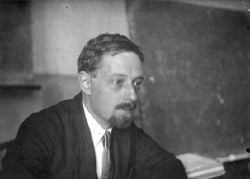Main Page
From New World Encyclopedia
Revision as of 20:31, 27 September 2010 by Gordon Anderson (talk | contribs)
Did you know?Solomon Asch's experiments uncovered the tendency to conform among many people, but they also revealed the existence of independence in the face of erroneous group opinion. (source: Solomon Asch) Values ForumDear Reader, The Values Forum of the New World Encyclopedia is an interactive, journal-style forum in which you can, write articles and commentary, and engage in debate and discussion with other NWE thinkers and contributors. Please sign up to participate. |
Featured Article: Vladimir Propp
Vladimir Yakovlevich Propp (April 29, 1895 – August 22, 1970) was a Soviet folklorist and scholar who analyzed the basic structural elements of Russian folk tales to identify their simplest irreducible structural units. Propp's work broke folktales down into a series of functions undertaken by actants. He identified 31 separate functions undertaken by actants fulfilling seven different roles. His syntagmatic approach was a form of semiotic literary analysis but differed from that of Claude Levi-Strauss, who disregarded the syntagmatic approach in favor of a paradigmatic one.
Popular Article: Hasidism
Hasidic Judaism (from the Hebrew: חסידות Chassidus, meaning "piety") is a Haredi Jewish religious movement that originated in Eastern Europe in the eighteenth century. Founded by Rabbi Israel ben Eliezer (1698–1760), also known as the Ba'al Shem Tov, Hasidism emerged when European Jews had grown disillusioned as a result of the failed messianism of the past century and the dryness of contemporary rabbinic Judaism, which focused on strictly limited Talmudic studies. The hasidic tradition represents a constant striving for an intimate give-and-take relationship with God in every moment of human life.
New World Encyclopedia integrates facts with values. Written by online collaboration with certified experts. |
Recently Updated> more recent updates
|

